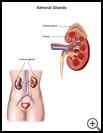
Addison's Disease (Adrenal Gland Problem)
________________________________________________________________________
KEY POINTS
- Addison's disease is a condition in which your adrenal glands do not make enough hormones.
- Addison's disease is treated with man-made hormones called steroids. You will need to take these medicines for the rest of your life.
- Follow the full course of treatment prescribed by your healthcare provider. Don’t stop taking your medicine or change the way you take it unless your provider tells you to.
________________________________________________________________________
What is Addison's disease?
Addison's disease is a condition in which your adrenal glands do not make enough hormones. Your adrenal glands are located near the top of each kidney and they make several different hormones. Hormones are chemicals made in the body that help with many functions, such as growth, development, and keeping blood pressure and blood glucose under control.
The two hormones affected by Addison's disease are cortisol and aldosterone.
- Cortisol helps your body respond to stress. It helps control body functions, such as blood pressure, blood glucose levels, turning the food you eat into energy, and how your immune system works. (The immune system is your body’s defense against infection.)
- Aldosterone helps control the level of water, salt, and minerals in your body.
Addison's disease is also called adrenal insufficiency. It is a lifelong condition. While there is no cure, symptoms may be controlled with treatment allowing a long and active life.
What is the cause?
Addison's disease is caused by damage to your adrenal glands. A number of different things may damage the adrenal glands:
- An autoimmune disease, which causes your body to mistakenly attack your own tissue (This is the most common cause of Addison’s disease.)
- Infection, such as tuberculosis (TB) or AIDS
- Injury, surgery, or bleeding inside your belly
- A problem with your adrenal glands that you have had since birth
- Taking steroid medicine at high doses or for a long time, which can cause your adrenal glands to stop making your own cortisol
- Cancer
What are the symptoms?
Symptoms of Addison's disease may start slowly. The most common symptoms are:
- Tiredness or weakness that gets worse over time
- Muscle aches
- Loss of appetite and weight loss
Other symptoms may include:
- Dizziness when you stand up
- Nausea and vomiting
- Diarrhea
- Skin darkening or patches of dark skin near scars, folds of skin, lips, and joints (elbows, knees, fingers, and toes)
- Craving salty food
- Low blood glucose
- Headaches
- Women may have irregular or no periods
You may not notice your symptoms until your body is stressed by an infection, injury, or surgery. The stress may cause a problem called adrenal crisis. Without treatment, an adrenal crisis can be life threatening. Signs and symptoms of crisis include:
- Sharp pain in your lower back, belly, or legs
- Severe vomiting and diarrhea
- Very low blood pressure
- Very low blood glucose
- Fainting
How is it diagnosed?
Your healthcare provider will ask about your symptoms and medical history and examine you. Tests may include:
- Blood tests
- A blood test called an ACTH stimulation test. ACTH is a hormone made in a part of your brain that tells your adrenal glands to make hormones. This test checks the way your adrenal glands respond to ACTH.
- CT scan, which uses X-rays and a computer to show detailed pictures of the adrenal glands
How is it treated?
An adrenal crisis is a medical emergency that needs to be treated in a hospital. Addison's disease is treated with man-made hormones called steroids. In most cases, you will need to take these medicines for the rest of your life.
If your adrenal crisis was caused by steroid medicines, your adrenal glands may begin to make cortisol again after weeks or months.
How can I take care of myself?
Follow the full course of treatment prescribed by your healthcare provider. Don’t stop taking your medicine or change the way you take it unless your provider tells you to.
Keep all appointments for tests. The tests can help make sure you are getting the right amount of medicine.
Be prepared for emergencies:
- Carry a cortisol injection kit for emergencies. You might need an emergency shot of cortisol when your body needs stress hormones, such as if you are in an accident.
- You should carry an ID card or wear a medical ID bracelet or necklace that says you have Addison's disease. If you need emergency care, surgery, or lab tests, this helps healthcare providers know how to treat you.
- Make sure friends and family know what to do for you in case of a serious illness or an accident.
Ask your healthcare provider:
- How and when you will get your test results
- How long it will take to recover
- If there are activities you should avoid and when you can return to your normal activities
- How to take care of yourself at home
- What immunizations you need to help prevent infections
- What symptoms or problems you should watch for and what to do if you have them
Make sure you know when you should come back for a checkup. Keep all appointments for provider visits or tests.

